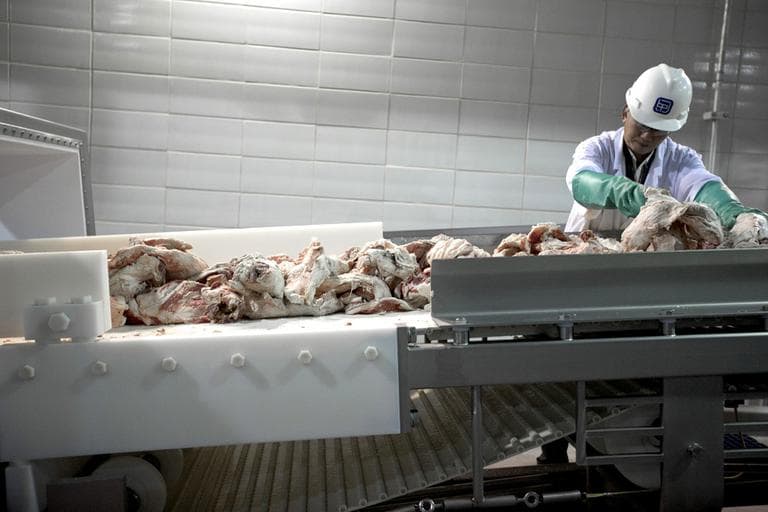Advertisement
Food That Sickens Millions Graded Safe By Industry Inspectors
Resume
In a scathing look into the state of food safety, Bloomberg Markets is out with an in-depth report that says for-profit companies have quietly taken over much of the Food and Drug Administration's role in inspecting food.
"I was surprised that there are 3,000 deaths a year in the United States from foodborne illness and I’m surprised the extent to which that is sort of acceptable," reporter John Lippert, who was part of the team that wrote the report, told Here & Now's Robin Young. "That’s as many people as were killed in the World Trade Center, but yet 3,000 is not something that gets a lot of attention unless you’re right in the middle of an outbreak."
Third party auditors, as they're known, are often hired by the food growers themselves, they sometimes don't visit the plants they inspect and when they do, they only examine what producers ask them to. They also don't have to make their reports public.
The Bloomberg report tells story after story of people who have gotten sick or even died from eating food that was graded safe by these auditors, including the 7-year-old Ohio girl who died in 2009 after kissing her grandfather in the hospital.
That light kiss on the cheek was enough for her to pick up the bacteria from the ground beef that had sickened him. The beef came from a company, Valley Meats in Illinois, which that same year had received a 95.5 out 100 safety rating from a third-party auditor.
Interview Highlights
A Problem That's Getting Worse
"There’s a strong indication that this problem could get worse. Right now, as an average consumer, the percentage of food that I eat that’s imported is about 20 percent and we've got forecasts quoted in the story that it’ll go to 50 percent by about 2030. So, right away you’re more deeply exposed to lots of countries around the world where the sanitation standards and the food safety culture is just not as well-developed as it is in the United States."
Tainted Cantaloupe From U.S. Farms
"We talked to the family of William Beach out in Mustang, Oklahoma. He was 87 years old, a retired truck mechanic, and he liked to eat cantaloupe. Well, last year a farm in Colorado started shipping cantaloupe that was tainted with Listeria monocytogenes. One night, William Beach collapsed, his wife found him the next day, they took him to the hospital, and he started bleeding. He started bleeding from his nose and his mouth. He started bleeding so much that he died that day."
An Under-Funded FDA Leads To Third-Party Inspections
"During the course of the 90s, the food industry itself responded to this vacuum by saying, 'Okay, well, let’s hire our own auditors,' and the whole cottage industry sort of grew up dozens of companies in the United States and dozens more overseas, but these are private companies."
Learning Where Our Food Comes From, And Who To Trust
"Along the way we talked to Darden, which is Red Lobster, and they import tons of seafood every day and they basically test every lot. They've got third party auditors, they've got their own auditors, and they say with some confidence that the pathogens in their shrimp coming from Vietnam or someplace have been reduced to zero. But when I look at our video of the tilapia in China being fed with feces..."
Guest:
- John Lippert, reporter at Bloomberg Markets magazine. He tweets @johnmlippert.
This segment aired on October 12, 2012.